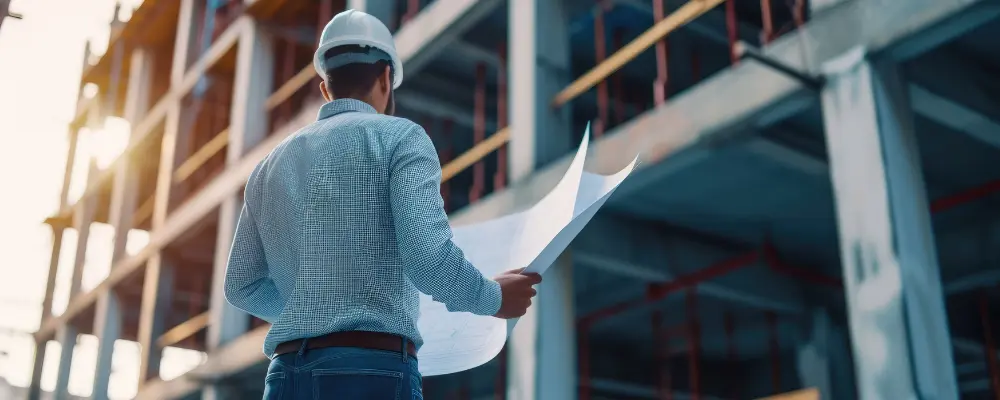Following building codes and construction project regulations is the most significant aspect of building construction in India. By doing so, you can protect the building’s occupants, ensure their safety and security, and complete your construction project without any delay or legal responsibility.
When it comes to project building regulations in India, the National Building Code is involved. It allows compliance with building laws, ensures the long-term durability and safety of a building, and maintains the comfort and safety of occupants.
Here, we will cover everything about construction project regulations.
About the National Building Code
The National Building Code, introduced to the market by the Bureau of Indian Standards, brings into light the guidelines for building structures that will last, maintain safety provisions, be sustainable, provide comfort, and be environmentally friendly. Basically, it’s a standard code that should be adopted by everyone involved in construction, whether it’s the public works department or the construction department of the government.
Why is It Important to Follow the National Building Code?
The NCB – National Building Code of India is a crucial building code that offers guidelines for regulating the construction of buildings across the country. Several essential documents describe the process, standard, and type of building construction in India. This building code provides guidelines for constructing institutional, commercial, and residential buildings. An NCB boosts a building’s safety by preventing hazardous materials from entering the construction process.
To develop structures that fulfil the norms and standards stated in the NBC, architects and builders must include these regulations in their designs. Consider your foundation, structural design, construction materials, plumbing service, lighting, and fire and life safety.
It’s important for anyone working in construction to understand the NBC. It helps them design buildings that are appealing, secure, and environmentally friendly by incorporating the objectives of the code into their structural plans.

Complying with Building Codes: Key Considerations for Construction in India
Land Use and Zoning Regulations
Constructing buildings in any Indian cities and towns calls for keeping up with the zoning regulations to begin the journey to successful infrastructure development. The land use and zoning compliance varies with each town depending on the building permissions process and restrictions.
Here are the top zoning regulations to consider for each type of property while constructing a building in India:
- Residential Zones:
All regions that allow the residential sector, such as building houses ranging from single-family to multi-family dwellings, have specific laws and regulations for constructing legal properties. However, low-density zones may prohibit the construction of large family homes, whereas high-density zones grant open access for larger buildings and more units per plot.
- Commercial Zones:
Commercial zones are specifically for businesses, retail shops, corporate offices, and other types of infrastructure to conduct business activities. These types of infrastructure are much taller than residential buildings. By meeting the zoning regulations, businesses get the green signal to build a property that meets all their business requirements.
- Industrial Zones:
Industrial areas are other zoning regulations for building property in India. These requirements are mainly to construct manufacturing infrastructure, warehouses, and other infrastructures that relate to maintaining strict pollution policies and safety regulations. Businesses with these properties under their control must maintain a proper balance to ensure that zones like residential and commercial are not impacted.
Building permits require compliance with zoning regulations. Developers must perform detailed land use analyses and consult with local planning authorities to align proposed projects with designated land uses.
Approvals and Permits for Buildings
Getting approval and permits is the most important building regulation to consider while constructing infrastructure in India. To get approval for the building, you are required to carefully prepare the documentation covering even the minute details. You are also required to contact the government authorities responsible for facilitating approval and permits for the building.
Here are some crucial approvals and construction permits in India required from each government authority:
- Development Plan Approval:
The local authorities oversee the infrastructure development plan approval process. They will closely check every aspect of the construction plan, which includes the site plan, architectural design, structural plans, measures to protect the environment and so on. Once everything is in place and according to the regulations, local authorities can begin to approve the development plan.
- Construction Permit:
Once the development approval process is complete, it is time now to apply for construction permits in India. Now, you need to draft the construction permit application, where you must present the construction drawings, specifications for materials, and construction methods. Besides, developers are also required to pay attention to public health, fire services, and environmental protection, which may also require approval. After getting the construction permit, developers can start the construction adhering to the regulations.
- Occupancy Certificate:
Occupancy certification is another crucial document to consider while constructing a building. This certification gives you complete assurance that the building holds all the safety standards to occupy and comply with all relevant regulations
Structural Safety
Infrastructure safety is an important building regulation to consider while constructing buildings in India, as natural calamities like earthquakes always stand to bring compromises along. Therefore, it is important to run through detailed analyses before construction to ensure the building can handle the lethal force of earthquakes.
This means designing crucial facets of construction that are efficient enough to manage the effect of earthquakes while keeping the standards high for the safety of occupants.
To comply with safety regulations, it is important to use high-end materials that exceed all safety expectations. Some of the top-class materials include cement, steel, and concrete, which ensure the structural stability of the building.
Fire Safety
Fire safety is an important building regulation to consider while constructing buildings. Fire can happen anywhere, from residential to commercial, so you cannot compromise fire safety considerations.
Even various government authorities have made it mandatory to have fire extinguishers and alarm systems in commercial to residential buildings to protect the people and buildings. Besides this, it is important to design the building with room for emergency exits to make a comfortable exit without getting caught by the fire.
Universal Design and Accessibility
Constructing a building that goes easy on all types of residents is an important building regulation to consider while developing buildings.
When constructing buildings, it is essential to integrate various elements like elevators, ramps, and toilets that meet all accessibility standards. These high-end features must be easy for wheelchair and crutch users and ensure that those using mobility aids will have no problems traversing the building.
By incorporating universal design principles, all users can benefit, regardless of age or ability. The goal is to create intuitive and user-friendly spaces that can be modified to suit various needs.
Conclusion
Complying with the building code while constructing property in India is important as it will help you avoid any further legal disputes. Legal requirements for construction projects specify adherence to minimum design requirements, construction, and maintenance of buildings. They allow real estate developers to perform the best practices to mitigate risk and even prevent accidents during construction. At Brick & Bolt, we meet your requirement to construct buildings following every aspect of building regulations.
As the best construction company in India, we construct buildings that are in the best interest of people. We ensure that every construction follows all the compliance so you do not have to hurdle with disputes.
Contact us today to construct a building that meets every building regulation.

